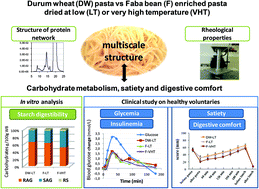Enrichment of pasta with faba bean does not impact glycemic or insulin response but can enhance satiety feeling and digestive comfort when dried at very high temperature
Abstract
Enrichment of durum wheat pasta with legume flour enhances their protein and essential amino acid content, especially lysine content. However, despite its nutritional potential, the addition of a legume alters the rheological properties of pasta. High temperature drying of pasta reduces this negative effect by strengthening its protein network. The aim of our study was to determine if these changes in the pasta structure alter its in vitro carbohydrate digestibility, in vivo glycemic, insulin and satiety responses. We also investigated if high temperature drying of pasta can reduce the well-known digestive discomfort associated with the consumption of legume grains. Fifteen healthy volunteers consumed three test meals: durum wheat pasta dried at a low temperature (control), and pasta enriched with 35% faba bean dried at a low and at a very high temperature. When enriched with 35% legume flour, pasta maintained its nutritionally valuable low glycemic and insulin index, despite its weaker protein network. Drying 35% faba bean pasta at a high temperature strengthened its protein network, and decreased its in vitro carbohydrate digestion with no further decrease in its in vivo glycemic or insulin index. Drying pasta at a very high temperature reduced digestive discomfort and enhanced self-reported satiety, and was not associated with a modification of energy intake in the following meal.


 Please wait while we load your content...
Please wait while we load your content...